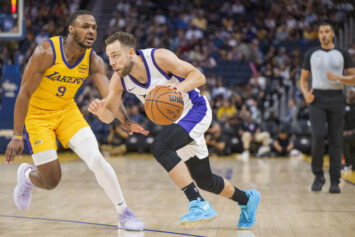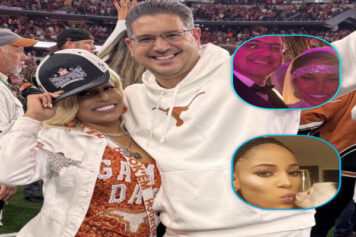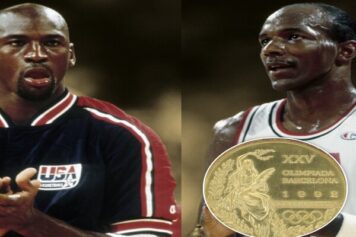When Overtime Elite was first announced and launched in 2021 folks said no way it would work. Overtime, a multimedia sports company, is paying 16-,17-, and 18-year olds $100,000 per year, plus bonuses, and shares of equity in Overtime.
The addition of the name, image and likeness (NIL) deals, which includes sales of custom jerseys, trading cards, video games and NFTs, and the right to sign direct sponsorships with sneaker companies has only sweetened the pot.
Now comes a report that they’ll be able to participate in NCAA- and AAU-certified events. In a story written by 247 Sports, the outlet claimed it was told of this groundbreaking move by an unnamed source and discussed how it could play out. Either way it’s an unprecedented move, as was the NIL over the summer.
Our first ever OPENING DAY is finally here. With us or against us, we got your attention now 🗣
5:00pm: OTE vs Dr. Phillips Basketball Club
6:30pm: OTE vs Vertical Academy
8:00pm: OTE vs KT Kings pic.twitter.com/tdWOb1nUiR— Overtime Elite (@OvertimeElite) October 29, 2021
This new development puts the onus directly in the hands of event organizers as to how they’ll now navigate these murky waters. Soon we could see some 16- and 17-year olds who are not entering their senior year of high school joining the top AAU circuits, such as EYBL, 3SSB, and the Under Armour Association.
https://twitter.com/overtimeelite/status/1445479677221502983?s=21
Meaning, some of these players for OTE could be a part of the illustrious Peach Jam held every July. The elite tournament crowns the EYBL spring/summer circuit champion. Since the OTE players are being paid, one remaining hurdle will be determining their eligibility to play NCAA basketball upon high school graduation. That remains to be seen, but this is a huge step in that direction.
Seeing @camreddish and @lonniewalker_4 come up through the program since early in middleschool, a pic like this will make your day!! @TeamFinalEYBL is so proud to have these guys as #TFFam!!! pic.twitter.com/kbDN1DOYIC
— Team Final Nike EYBL (@TeamFinalEYBL) November 24, 2021
OTE would first have to restructure the current deals they’re shelling out to fit NIL rules and restrictions, as they must comply with the NCAA’s rule changes.
In a November New York Times article, this very topic was discussed.
“It seems logical that Overtime Elite’s players may eventually be able to do the same. If their contracts are restructured so that they’re playing basketball unpaid but selling Overtime Elite the same name, image and likeness rights that college players now control, the N.C.A.A. might be persuaded to amend its rules. Those who find that unlikely should consider that many of the Overtime Elite players will have huge followings by the time their classes graduate. Would the sponsors that underwrite March Madness prefer that they play in college at that point, or somewhere else?”
BRYCE GRIGGS SENDS IT TO OVERTIME 🚨 @griggs_32 @OvertimeElite pic.twitter.com/NmDLlgsTMH
— Overtime (@overtime) October 30, 2021
NIL Has Forever Changed Collegiate Sports: Could Affect OTE In A Positive Way
In June the NCAA passed interim rules allowing students in all states to begin monetizing their own personal NIL on July 1. The rules stated those with an effective state law to follow the provisions of the laws, while institutions in states without effective laws were free to set their own guidelines.
This has resulted in a patchwork of state laws, NCAA rules and institutional policies across the country, and a continued urging for Congress to enact a standard uniform law. Some athletes have benefited mightily from it, but there are many loopholes that need to be tightened up, to ensure that everyone is at least attempting to play by the same rules.
🚨Attention Student-Athletes🚨
Act fast as spots are filling up quickly! Make sure to check out https://t.co/Qaa3hkEBMm for everything you need to know about how to attend the #NILSummit
You won’t want to miss this historical event! pic.twitter.com/DtcqF0WAXi
— The NIL Summit (@NILSummit) February 16, 2022
Adding college as another pathway only enhances the upcoming grass-roots structure. Certain athletes now feel like they have that option if they aren’t ready to go pro.
This has the makings of something great, but Congress has to step in and set some things in stone, in order to keep it as fair as it can on the outside. And the punishment for breaking the bylaws should result in some major consequences. The NIL ruling is a blessing, now let’s get some mandates attached before it’s ruined before it ever gets a shelf life.
NIL deals have been rolling in for Caleb Williams since his transfer decision to USC✌️
His NIL Valuation: https://t.co/xWGZEnMPMC pic.twitter.com/Q5qQvR9dXd
— On3 NIL (@On3NIL) February 10, 2022
They say rules are made to be changed, and OTE athletes could bring some much-needed exposure and visibility to a struggling NCAA men’s basketball landscape, that is struggling to corral the same elite talent as it has in the past because there are other options for players who would usually just go to college for one season until they reached draft-eligible age.
More news from our partners:
Finurah Funding Friday: Grant Writing Tips, Funding From FedEx, American Express and More



